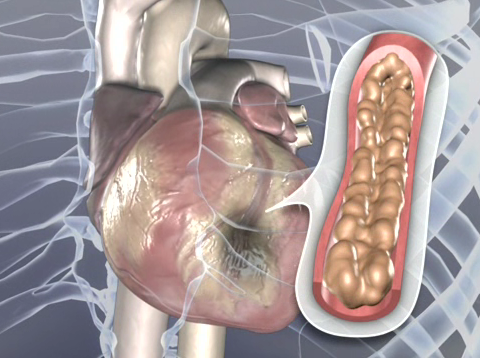November 4, 2013 — According to a new
study,
genetic profiling of patients undergoing percutaneous coronary intervention (PCI) may help
cardiology teams adjust treatment and improve ischemic outcomes for patients who do not properly metabolize thienopyridine blood thinning therapies such as clopidogrel.
Findings from the GIANT trial were presented at the 25th annual Transcatheter Cardiovascular Therapeutics scientific symposium (TCT 2013).
The GIANT trial evaluated the clinical impact of CYP2C19 genetic profiling and compliance to an adjusted thienopyridine treatment. The primary endpoint was a composite of death, myocardial infarction and stent thrombosis after one year in slow responder patients with appropriate therapy after genotyping, compared to non-slow responders.
The prospective, multicenter, single-arm study enrolled 1,499 patients at the time of primary PCI (onset chest pain < 24 hours). Genetic profiling was performed within 48 hours after intervention to detect a loss of CYP2C19 gene function and identify a resistance to clopidogrel. Strong recommendations for treatment adjustment were sent to investigators when patients were identified as slow responders.
Dual antiplatelet therapy (DAPT) was prescribed for 12 months after PCI and one-year follow up was performed in 96.4 percent of patients (n = 1,445) including objective assessment of compliance. A total of 22 percent of patients (n = 319) had a profile associated with a CYP2C19 loss of function, known as the slow responder group. The remaining patients constituted the control group.
In the slow responder group, 85 percent received an adjusted thienopyridine regimen after the release of the genetic profile. Within the slow responder group, the patients who received adjusted therapy experienced fewer adverse events compared to those who did not receive adjusted therapy (3.3 percent versus 15.6 percent, respectively) after one year. Further, the patients who received adjusted therapy experienced a similar rate of adverse events as the control group (3.3 percent versus 3.04 percent). Poor compliance to treatment was objectively identified in 4.9 percent of patients at one year, and those patients experienced numerically more ischemic events.
“Results from the GIANT trial suggest that in patients with acute myocardial infarction treated with primary PCI, identification of a slow response to clopidogrel with subsequent adjustment of treatment leads to similar one year major ischemic event rates to patients with a favorable genetic profile to clopidogrel response,” said Bernard Chevalier, M.D., L'Institut CardioVasculaire Paris-Sud in Massy, Francem and lead investigator of the trial. “These findings may help determine alternative treatment strategies for patients identified as CYP2C19 poor metabolizers.”
The GIANT trial was funded by Biotronik. Chevalier reported receiving research grants/speaker fees or being a consultant for Abbott Vascular, Asahi, Astra Zeneca, AVI, Boston Scientific, Biotronik, Colibri, Cook, Cordis, Daichi-Sankyo, Eli-Lilly, Iroko, Medtronic and Terumo. He is also currently a minor shareholder and director of CERC, a clinical research organization.
For more information: www.crf.org


